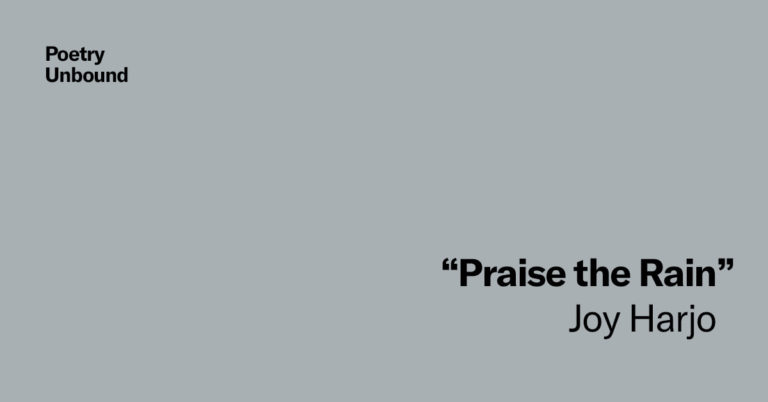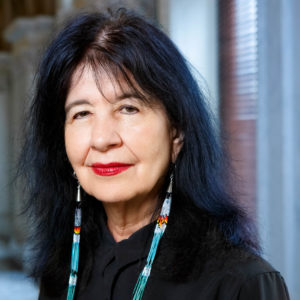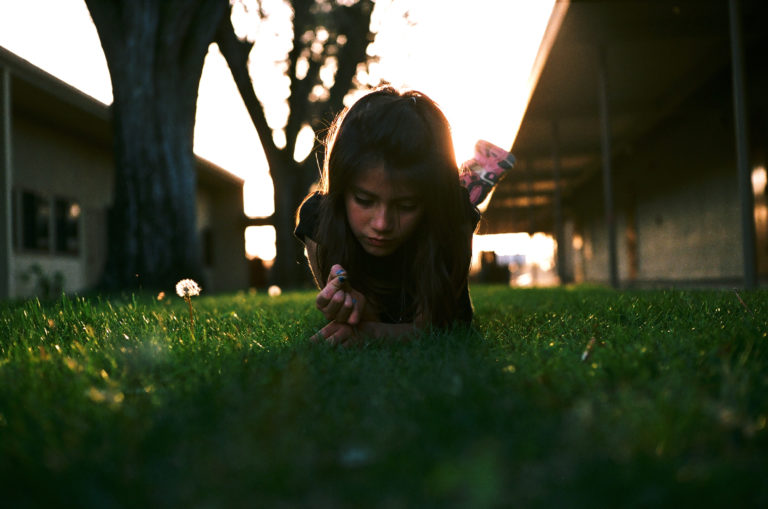Joy Harjo
Praise the Rain
Joy Harjo’s poem “Praise the Rain” makes space to appreciate all the nuances of our lives. Echoing Rumi’s poem “The Guest House,” she asks us to be present to this moment — the crazy or the sad, the beginning or the end — to greet it all with the powerful word: “Praise.”
A question to reflect on after you listen: What can you praise today?

© All Rights Reserved.
Guest

Joy Harjo is a member of the Muscogee Creek Nation and the 23rd Poet Laureate of the United States. She is the author of 10 books of poetry, including An American Sunrise, Conflict Resolution for Holy Beings, and She Had Some Horses, and the memoirs Crazy Brave and Poet Warrior. Her most recent poetry collection is Weaving Sundown in a Scarlet Light: Fifty Poems for Fifty Years. She’s also produced several award-winning albums of music, including her most recent, I Pray for My Enemies.
Transcript
Pádraig Ó Tuama, host: My name is Pádraig Ó Tuama. I’m a poet from Ireland, and I think that poetry offers the world something that’s small enough to carry close to your heart and big enough to carry all the ordinary things that can be encompassed in any one day.
[music: “The House You Wake In” by Gautam Srikishan]
“Praise the Rain” by Joy Harjo:
“Praise the rain, the seagull dive
The curl of plant, the raven talk —
Praise the hurt, the house slack
The stand of trees, the dignity —
Praise the dark, the moon cradle
The sky fall, the bear sleep —
Praise the mist, the warrior name
The earth eclipse, the fired leap —
Praise the backwards, upward sky
The baby cry, the spirit food —
Praise canoe, the fish rush
The hole for frog, the upside-down —
Praise the day, the cloud cup
The mind flat, forget it all —
Praise crazy. Praise sad.
Praise the path on which we’re led.
Praise the roads on earth and water.
Praise the eater and the eaten.
Praise beginnings; praise the end.
Praise the song and praise the singer.
Praise the rain; it brings more rain.
Praise the rain; it brings more rain.”
So one of the things that I feel like this poem does is, it feels like a contemporary response to Rumi’s beautiful poem “The Guest House.” Rumi has this gorgeous poem that says, “This being human is a guest house. Every morning, a new arrival.” And he goes on to describe that “arriving at the door, perhaps a seemingly unwelcome visitor, a joy, a depression, a meanness, an awareness, a crowd of sorrows, the dark, the shame, the malice.” And Rumi suggests that you should meet them all at the door, laughing. It’s a very joyous poem in the middle of knowing lots of the dynamics of being human.
And I feel like Joy Harjo’s poem does something similar, but actually, she doesn’t tell you how to be; she doesn’t say what your mood should be. She just says, “Praise.” She doesn’t say, “Be happy.” She doesn’t say, “Smile.” She doesn’t say, “Embrace all of these things.” She simply says, “Praise.” Praise this; praise that; praise them all. She gathers them all into a whirlwind of belonging, a whirlwind of being human. And I think it’s a very comforting poem, because this isn’t saying, “This is the way you should be.” You can read this poem on a terrible day and go, “Joy Harjo told me to praise crazy, praise sad. And that’s as much as I can manage today.” And I think it brings being yourself, and being yourself in the midst of the changing dynamics of a day or a month or a year or a season — it brings all of that into some kind of embrace of belonging.
And in the middle of it, she poses these extraordinary questions, because the poem, I think, when you hear it first, you can just think, “Oh, it’s all about nature. Lovely.” And everything is recognizable.
But when you begin to make inquiries of the poem, you suddenly find all of these restless things at the heart of the poem, things that can’t be contained. Why is the house slack, for instance? Or why does the raven talk, and what does the raven say? Why do we care about the warrior’s name? You also wonder, what does it mean that the sky is backwards and upward? And when you find all of these mysteries, these slightly restless, sometimes, perhaps, even mildly menacing factors at the heart of this, it can make you pay attention to the dynamics of these similar things in your own life, and think, “They too have a place. Praise, praise the rain,” and to find yourself being drawn back into the natural world in the middle of all these things that are utterly uncontainable.
“Praise the Rain,” by Joy Harjo:
“Praise the rain, the seagull dive
The curl of plant, the raven talk —
Praise the hurt, the house slack
The stand of trees, the dignity —
Praise the dark, the moon cradle
The sky fall, the bear sleep —
Praise the mist, the warrior name
The earth eclipse, the fired leap —
Praise the backwards, upward sky
The baby cry, the spirit food —
Praise canoe, the fish rush
The hole for frog, the upside-down —
Praise the day, the cloud cup
The mind flat, forget it all —
Praise crazy. Praise sad.
Praise the path on which we’re led.
Praise the roads on earth and water.
Praise the eater and the eaten.
Praise beginnings; praise the end.
Praise the song and praise the singer.
Praise the rain; it brings more rain.
Praise the rain; it brings more rain.”
Lily Percy: “Praise the Rain” comes from Joy Harjo’s book Conflict Resolution for Holy Beings. Thank you to W.W. Norton, who published the book, and to Joy for letting us use her poem. Read it on our website at onbeing.org.
Poetry Unbound is Tony Liu, Chris Heagle, Kristin Lin, Erin Colasacco, Serri Graslie, Eddie Gonzalez, and me, Lily Percy. Our music is composed and provided by Gautam Srikishan. This podcast is produced by On Being Studios, which is located on Dakota land. We also produce other podcasts you might enjoy, like On Being with Krista Tippett, Becoming Wise, and This Movie Changed Me. Find those wherever you like to listen or visit us at onbeing.org to find out more.
Books & Music
Recommended Reading
The On Being Project is an affiliate partner of Bookshop.org and Amazon.com. Any earnings we receive through these affiliate partnerships go into directly supporting The On Being Project.






